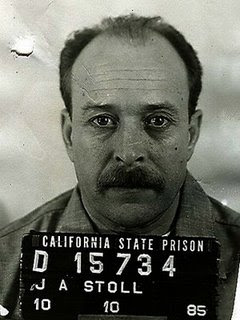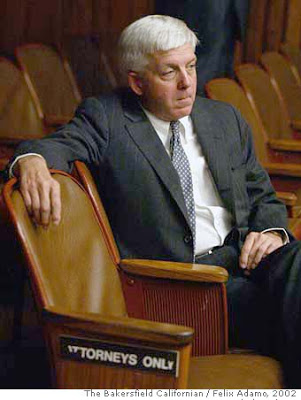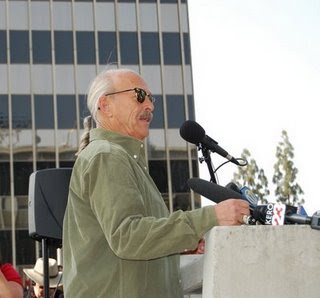Friday, July 24, 2009
Child-Snatchers and Life-Stealers — Pt. I

The haunted eyes of an innocent man: John Stoll, wrongfully convicted of molesting several children, including his only son, near the beginning of a 40-year prison term. The state managed to steal twenty years of his life before his conviction was overturned in 2004, on his 61st birthday.
“You’re cultivating disrespect for government in your children!” protested a relative not long ago. “Every way I can think of doing so, with each opportunity that presents itself, every single day that God sends me!” I responded.
Children are never too young to be taught to despise the State, to distrust its agents, and to avoid cooperating in any way with the mechanism of official plunder, deception, and coercion. Parents should seek to instill such attitudes in their children as soon as possible, if for no other reason than to protect them from being abused at the hands of those employed by what Orwell might have called, with suitable irony, the Ministry of Compassion — that is, those employed by the official child-snatching apparatus.
Witch Hunt, a potent new documentary produced and narrated by Sean Penn, depicts in unbearably stark terms what happens when the institutionalized affliction called the criminal “justice” system extends its compassionate care to children it has arbitrarily designated victims of sexual abuse.
That children are thus victimized is a tragic reality, but none of the children in this story was molested by any of those prosecuted and convicted of that hideous crime. However, those children were molested by agents of the State.
Prosecutors and social workers put those children through a now-familiar form of officially sanctioned ritual abuse. They were seized from their families at gunpoint, placed under wrap-around supervision by government employees, and subjected to lengthy interrogation and indoctrination sessions designed to suborn perjured testimony from them and, if possible, to convince them that they had, indeed, been molested by the defendants.
This was a kind of sinister ventriloquism in which malicious, depraved prosecutors spoke through the puzzled, terrorized children. Recordings of the interrogation sessions revealed that rather than asking the children what had allegedly happened to them, the investigators would weave a detailed narrative of abuse and then extort a child’s assent to the fabrication. The results were then canonized as “evidence” in a grand jury indictment. The children themselves were allowed to change their stories on the witness stand, as long as some serviceable accusation remained intact.
And the only “evidence” presented against the defendants consisted of the testimony of the child accusers. Such testimony, unless corroborated by some other source, is not evidence: It is mere accusation, however winsome or sympathetic the accuser.
The setting of Witch Hunt is Bakersfield, California, in the mid-1980s, near the beginning of what would be a decade-long plague of government-propagated mass hysteria over child abuse. That epidemic had been brewing since 1974, when Congress enacted the Child Abuse Prevention and Treatment Act (also called the “Mondale Law”), a measure federalizing the investigation and prosecution of child abuse and laying the groundwork for a national system of child abuse “reporting.”
Subsidies provided through CAPTA stimulated the growth of a population of social workers steeped in post-feminist dogmas about the repressive nature of the patriarchal home; from that perspective, every traditional family was abusive, it was just a question of defining how.
Federal money likewise realigned the priorities of local law enforcement bodies toward the investigation of child abuse. This led to police and Sheriff’s deputies acting as hired muscle for social workers who were given the power to break up families and abduct children on a whim. CAPTA also created mandatory child abuse reporting requirements for certain professions, and led to the creation of a nation-wide abuse “hotline” network. This is the mechanism that makes possible the seizure of children, and the incarceration of adults, on the basis of anonymous accusation.

A localized child abuse “epidemic” can erupt anywhere the following elements are found:
A suitably ambitious District Attorney; a dutiful and incurious local law enforcement agency; a coven of ideologically zealous social workers; local media that bulimically repeat the State’s official line as “news”; and a handful of domestic disputes — such as recent divorces — out of which a single malicious abuse accusation can materialize.
From a single uncorroborated anonymous accusation it is possible for child-snatchers to construct an entire colony of child abusers. Simply construct an investigative model in which every child connected in any way to the suspect is regarded as a victim, and start interrogating them on that basis. Let the local press know that there are serious “concerns” about a “ring” of molesters, and have some suitably photogenic reporter describe possible “signs” or “symptoms” that a given child has been abused. This is quite easy to do, since practically any child behavior can be classified as a symptom of abuse.
Once this is done, the child snatchers can expect immediate results as anxious parents call to report that their children are displaying “symptoms” of abuse. In this way, the process described above can replicate itself several times before public skepticism sets in. Even then, sometimes it’s possible to implicate outspoken skeptics as potential abusers. In any case, this approach is all but guaranteed to create a child abuse scandal that can last for at least a year, drawing dozens of innocent people into the vortex and sending at least a few of them to prison.

A native of Pasadena and the product of a borderline aristocratic family, Jagels radiated ambition and suppurated arrogance. Jagels only had to win election once; since then, with the aid of local law enforcement, he has been, according to his critics, the de facto dictator of Kern County.
To get some sense of Jagels‘ proprietary brand of malice, consider the following.
Shortly before divorcing his first wife, Bryanna, Jagels called the police to report that she had a prescription drug addiction. He then called a press conference to announce that he was going to “stand by” his wife, only to serve her with divorce papers a week later.
The filing was dated November 25 — the day before the press conference at which Jagels professed his determination to honor his vow to stay with his wife “in sickness or in health.”
Jagels then threatened to use his office to provide the divorce court with additional information about Bryanna’s alleged illegal activities unless she agreed to give him full custody over their 5-year-old son.
Whatever Bryanna’s offenses might have been, Jagels‘ threat was a compound crime — a misuse of his office coupled with blackmail. This conduct was entirely typical of Kern County’s anti-crime crusader.
“Ed Jagels will stop at nothing to do someone in if they cross him,” testified a former prosecutor who worked under him. “He is really poison. They call him J. Edgar Jagels. Hoover had so much dirt on people and so much power, you couldn’t take him out. That’s the way Ed is.”
During Jagels‘ 1982 campaign, an associate illegally obtained a confidential court document from a 1975 child molestation case heard by Judge Marvin Ferguson, Jagels‘ opponent. During a debate, an ally of the Jagels campaign, citing the document, accused Judge Ferguson of imposing an excessively lenient sentence in that case, thereby contributing to the subsequent death of the abused girl. This claim was difficult to support on the basis of the available facts, but it provided Jagels with an issue to use against Ferguson — and the basis of a crusade once elected to the D.A. post.
Immediately upon becoming D.A. in 1983 , Jagels began a jihad against child abuse, eventually directing the larges prosecution of accused molesters in American history. A chromosome-level Republican with state-wide and national ambitions, Jagels understood the unique potential of child abuse as a trans-partisan political issue: It couples the politics of victimhood with a visceral appeal for severely punitive justice, thereby offering something for liberals and conservatives alike.
Under Jagels, recalls Rolling Stone, “police and social workers didn’t just follow up on accusations of molestation — they sought them out like desperate salespeople working on commission.” Given the financial rewards offered by the Feds on account of CAPTA and other measures, that isn’t so much a simile as a direct parallel.
Teams of investigators and social workers would drive through neighborhoods with captive children, instructing them to point out where the “bad people” live. The children themselves were often seized from parents in the middle of the night and then subjected to what is now commonly called “enhanced interrogation”: They were deprived of sleep and pestered with hostile questions as if they were captured enemy combatants. Those who played along were rewarded not only with the warm, smiling approval of their adult captors, but also taken on shopping sprees to buy toys, clothes, and other inducements to continue “cooperating.”
Those who didn’t collaborate were often told that the only way they could ever see their parents and families again would be to tell the investigators what they wanted to hear. One young boy was told that his mother, a Mexican immigrant, would be deported if he didn’t “admit” to being abused. One young girl, Carla Modahl, was promised that if she “admitted” to being molested by her father, Jeff, she would be free to rejoin him.
Such promises were lies, of course, even though the threats were probably sincere. Nor should anyone have expected any better. These were government employees, of course — people for whom lying is a profession.
As the pressure on the children mounted, the tales became progressively implausible — a fact that actually helped turn public opinion against the defendants. Children supposedly described being forced to participate in orgies; being hung from hooks and sodomized; witnessing ritual child sacrifice and cannibalism.
Not a molecule of evidence was discovered to corroborate any of this, yet Jagels and his wrecking crew claimed to have identified eight child molestation “rings” operating in Kern County. The only evidence offered by the prosecution consisted of the child accusers themselves, some of whom attempted to recant their testimony.
Carla Modahl, who had been promised that she would be restored to her father if she “admitted” to being abused by him, attempted to retract her testimony after he was sentenced to eighty years in prison. In a note sent to her father, Carla admitted: “I lied in court. I’m so sorry for lying about this, Dad. I sure miss you and love you so much. I wish you could come home soon.”
Carla’s older sister Teresa denied on the witness stand that she had ever been abused; the only “evidence” against Jeff Modahl came in the form of Carla’s suborned testimony. When Jeff’s motion for a new trial was dismissed, Carla attempted to commit suicide by overdosing on the medication she had been prescribed for depression. She was twelve years old at the time, and would attempt to kill herself on sixteen subsequent occasions.
According to social workers and the DA’s office, Carla’s suicidal tendencies were a confirmation of the abuse she had purportedly suffered at the hands of her father.
That she was abused there is no question: She was seized from her father at gunpoint, blackmailed into perjuring herself by government “authority figures,” and — in a genuinely Sovietesque touch — drugged into a stupor during the trial in order to keep her compliant. In their pursuit of Jeff Modahl, Jagels and his comrades weren’t content to terrorize Carla and keep her in a Thorazine-induced fog.
During the trial, Jagels‘ office deliberately withheld two critical pieces of exculpatory evidence: A medical exam that found no physical evidence of sexual molestation, and a tape recording of a social worker pressuring Carla into affirming invented stories of sex abuse.
Similar methods were used to convict 41-year-old John Stoll, a recently divorced carpenter who was given a 40-year sentence on 17 counts of “lewd and lascivious conduct” with several boys, including his only son, Jed.
Eventually all of Stoll’s accusers would recant their stories, except for Jed.
To this day, although he cannot provide specifics, Jed insists that he was abused somehow at some time by his Dad.
It’s important to note, however, that Jed was not the initial accuser; the charge originated with a suggestion made by a social worker to Stoll’s ex-wife when the latter complained about Stoll’s unorthodox, non-authoritarian parenting style. This little bit of malicous whimsy was enough to set in motion a campaign of prosecutorial misconduct that stole twenty years of Stoll’s life.

In all, some 29 defendants were sent to prison for an aggregate of 400 years. Eventually, every single one of those convictions would be overturned (except for a handful of cases in which the victims died in prison) as the child accusers grew up and asserted themselves against their abusers — meaning Jagels and his minions — by telling the truth.
Neither Jagels nor any of his associates has been held accountable for their crimes. Sure, Kern County paid a $4.5 million settlement to the victims, but this is simply another instance in which local taxpayers are forced to pay for the crimes of their elected “representatives.”
Jagels remains in office. While the decades have muted his ambition, his malice has lost none of its potency. Jagels has never admitted wrongdoing, and deflects all criticism of his conduct with smirking defiance. At 59 years of age he’s by no means too old to receive the thorough and pitiless ass-thrashing he has richly earned and, in a just world, would receive.
In the next installment: The alleged sex crimes Jagels covered up while he was sending dozens of innocent people to prison.
Don’t forget to tune in to Pro Libertate Radio on the Liberty News Radio Network.
On sale now.
Dum spiro, pugno!
Content retrieved from: http://freedominourtime.blogspot.com/2009/07/child-snatchers-and-life-stealers-pt-i.html.





